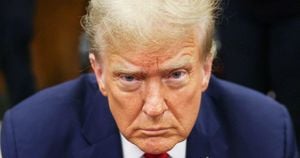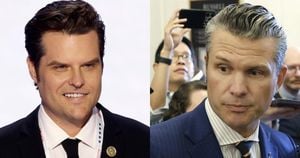Following a significant shift in San Francisco's political scenery, the aftermath of the recent elections has opened the door to both fresh opportunities and persistent challenges for the city's residents. With the election of Daniel Lurie as the new mayor, who previously held no elected office, many San Franciscans are hoping for long-awaited changes.
Lurie, heir to the Levi Strauss fortune, emerged victorious over incumbent London Breed, who struggled during her tenure due to rising crime and homelessness. Voter turnout indicated frustration with the city's leadership, particularly concerning the inability to address these pressing issues adequately. "People voted for change," noted Tom Wolf, one of Lurie's supporters, reflecting the desire for new strategies to confront San Francisco's struggles.
Homelessness and crime were at the forefront of voters' minds, with over 31% of respondents from polls identifying these challenges as their primary concerns, overshadowing national issues like the economy and cost of living. The city's growing homeless population, now numbering more than 8,300, has become more visible, especially with scenes of open drug use plaguing neighborhoods like the Tenderloin.
San Francisco's recent elections also impacted local institutions. City College of San Francisco held its trustee elections, resulting in the re-election of three incumbents and the addition of Heather McCarty. While voters promoted continuity, City College is grappling with financial stability and accreditation concerns.
Since 2012, City College has been under scrutiny from the Accrediting Commission for Community and Junior Colleges, nearly losing its accreditation back then. Recent warnings have indicated the need for renewed focus on the governance and financial management of the institution. New trustees face the challenge of selecting proper leadership after the recent departure of Chancellor David Martin, who left amid disagreements on budget priorities. While their alliance on students' needs provides some comfort, uncertainty lingers over the future of the institution and its ability to maintain free tuition for San Francisco residents.
Post-election, Lurie made commitments to tackle the drug crisis aggressively. He intends to declare fentanyl use as an emergency on his first day, which signifies his administration's response to the community's demands. He also has pledged to create more transitional housing and increase resources for the homeless population, acknowledging the deep-seated issues stemming from the city's progressive policies and their potential failures.
On the other hand, some political insiders express concerns over the political shift and Lurie's potential approach to governance. Lurie's focus on AI and tech initiatives aims to encourage tech companies to return to San Francisco, fostering economic rejuvenation. Yet, there are conflicting opinions about whether such strategies can resolve the immediate pressing concerns of safety and public order.
Meanwhile, the outgoing mayor, Breed, still holds significant influence as she prepares to make her final appointments to the Board of Supervisors. Her choice to fill the vacated seat by Catherine Stefani is under scrutiny as it could set the tone for Lurie's term. Speculation surrounding names like Conor Johnston, known for his aggressive tactics and sharp rhetoric, hints at contentious dynamics within the city government. Board of Supervisors President Aaron Peskin cautioned against appointing Johnston, citing it as sending the wrong message to the new administration.
The atmosphere within San Francisco's political sphere remains charged with high hopes juxtaposed against tangible fears about governance and public safety. After years of progressive policies being challenged, voters seem to seek accountability and responsive leadership. Lurie is at the forefront of this change, promising to address the concerns raised by constituents and break from the past approaches.
San Francisco's post-election scene presents contrasting narratives. While there are voices eager for rejuvenation and new ideas, continued struggles with homelessness, crime, and drug use loom large. Engaged voters signal the need for transformation; the question now is whether the elected leaders can uphold their promises amid complex challenges. The long-term goals of ensuring public safety, economic revival, and vibrant community services are intertwined, demanding cohesive strategies from the newly elected officials. This remains to be seen as the city braces for what the future holds.



